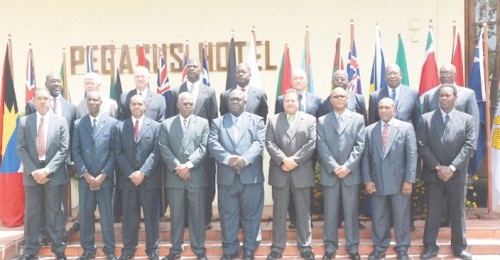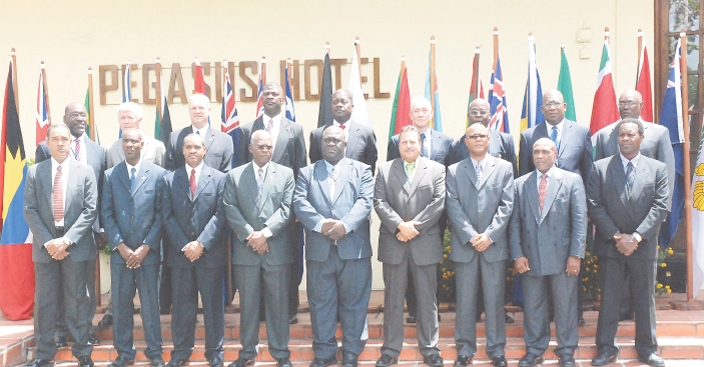In a thinly-veiled critique of conditions under which members of the Guyana Police Force serve and those in which detainees are held, Caricom’s Assistant Secretary-General Dr Edward Greene yesterday called for security to move away from brute force tactics, while President Bharrat Jagdeo insisted that such methods were sometimes justified in the fight against violent crime.

Addressing the opening of the annual conference of the Association of Caribbean Commissioners of Police (ACCP) at the Pegasus Hotel, Greene said that while many regional governments have made investments in upgrading the infrastructure to facilitate the work of the police services, much more need to be done to improve the enabling environment in which officers function.
He used the situation in Guyana to make his case, saying a visit to several police stations in Georgetown and its environs would illustrate the “substandard facilities” in which police officers are expected to work and be effective as well as “dehumanising conditions” under which persons are detained. These conditions, he said, “epitomise the abuse of their human rights. This, in turn, has serious implications for the image of the police and the legitimacy of their role as one of the agencies of human and social development. Hopefully, these conditions in our detention centres and prisons are not widespread throughout Guyana and the region. If so, there is a crisis that must be urgently addressed.”
Greene’s description of the conditions under which detainees are held echoed a host of complaints about the less than humane conditions under which persons are held at some holding facilities, and in particular the Brickdam lock-ups.
In what appeared to be a clear response to Greene, President Jagdeo admitted that the working conditions for police officers are not ideal, but he said the country is still recovering from a period where a large portion of its resources went to servicing debt. He also insisted that the escalation of violent crime, in which AK-47s are being used, justifies the use of brute force.
According to Greene, who is Ambassador of the Directorate of Human and Social Development at Caricom, any strategy of police reform needs to incorporate the improvement of the conditions of service for police officers as well as the environment in which citizens are detained or incarcerated. He told the commissioners that the ACCP can greatly contribute by establishing protocols and standards for implementing requirements in the areas that form part of the “structure of police reform, intended to combine appropriate punishment with a formula for rehabilitation of those who commit crimes and reintegrating them into society, as worthwhile citizens.”
In his feature address, President Jagdeo said the government is constantly working towards improving the conditions for police officers. However, he said that while the conditions are not ideal, he has seen what commitment and leadership can do, citing results in crime fighting because of the commitment of Police Commissioner Henry Greene and Army Chief-of-Staff Gary Best. “We are coming out of a tough situation, we don’t have the best conditions in the world but I am proud of them because they have performed well… comparable with many countries who have better pay,” he said.
Distinctly disturbing
According to Greene, the challenges faced by the region in dealing with crime and violence are well known, given the distinctly disturbing crime statistics for many countries. He said the strategy enunciated by Caricom’s Council for National Security and Law Enforcement (CONSLE) places emphasis on collaboration in border security, information and surveillance, witness protection, control of drugs and arms, training and capacity building of the law enforcement and protective services.
Although there has been some progress, he said, it is increasingly being recognised that “the key to sustainable programme rests with the construction and implementation of crime prevention strategies.” This, Greene added, requires a new approach to partnership between the police and other stakeholders in the government service, private sector, civil society, the schools and youth movements and faith-based organisations. “There ought also to be an alliance between the police and our research centres that provides analysis of trends and guidelines for behaviour change,” he said.
He urged that the ACCP follow up with and support the call of the Vice-Chancellor of the University of the West Indies for the establishment of a Centre of Excellence for Crime and Violence to be involved in research and training. Greene said it could be a useful focal point to provide the empirical information to guide, monitor and evaluate the impact of police reform programmes.
According to Green, the underlying factors of police reform rest with the creation of viable networks around common goals and practices and he quoted part of a Stabroek News editorial, which he said aptly articulated what needs to be done in police reform: “The events of the past decade have made it clear that the brute-force tactic of sending out hunting parties to shoot bandits has not eradicated those transnational crimes which keep pumping guns, drugs, dirty money and criminal violence into the country. Systematic police reform − that emphasises crime intelligence and human security − is necessary if the country is to enjoy a sustained era of public safety and economic stability. Only a transformed security environment will attract foreign investment and persuade local talent to remain in the country.”
However, President Jagdeo told Greene that there are times when brute force needed to be used by police officers. “Yes Eddie [Greene], we need brute force because when you have people shooting at you with AK-47s you need to send out brute force with AK 47s to get back at them. You can’t go out there and smile and shake their hands and negotiate.”
The president also stressed that policy makers need to be unambiguous in their support of the security forces, adding that there should be care with regard to human rights. He explained that it sometimes appears that the scale is tilted more in favour of the perpetrators than the victims “and that can’t be right.” He said the organisations that tout human rights need to take in consideration that there are sometimes psychopaths with AK-47 rifles slaughtering people.
When addressing the issue of the root cause of crime, President Jagdeo said there is need for analysis, because while bad economic times may cause more persons to be involved in crime, in the case of drug dealers the motivation is greed and not poverty.
Transnational
Meanwhile, President Jagdeo said that to address the crime situation in the region domestic actions alone would not be sufficient. He explained that crimes being committed now are not the same as in years gone by because crime has now become transnational, based on the flow of drugs and guns into the region.
As he has done in the past, the president called for a partnership between the developed and developing nations, saying they should be multilateral with all countries operating as equals. He called on the commissioners to analyse how the developed countries act when they are faced with security challenges to their societies. He pointed out that after the 9/11 terrorist attack in the US, the Republicans and Democrats came together and passed the Patriot Act, which reversed many of the gains that the civil rights movement fought for over many years.
“Sometimes I think we feel ashamed when we have to act to protect our societies, we are ashamed because we think we are reversing civil gains and that may be a cause for concern…. But we are not on the same level, society does not act together, opposition and governments don’t get together; often they play politics with crime in our societies,” Jagdeo said.
He said smaller countries are often lectured to by the developed countries and are placed in international reports as eroding civil rights when they are doing the opposite. “And we feel ashamed because we feel we have to comply with this international notion of civil rights behaviour while our people are suffering and while they are crying out for tough actions,” he noted.
He said the region’s countries have to do the things that are practical to give their security forces the same tools that the security forces have in the developed world. The president added that it does not have to do with money but also the legislation which could better enable them to fight crime. According to Jagdeo, the fixation with strategies often overshadows the tools which should be given by the policy-makers.
President Jagdeo also spoke about the challenge posed by the reorientation of the economies in the region. He said many countries have fiscal deficits and as result the calls for them to spend more money on security would fall on deaf ears or exacerbate the situation. The president also touched on food security and the issue of climate change, saying both are challenges that pose a catastrophic risk to the territories. As an illustration of the risk the region faces from climate change, he noted that the flood experienced by Guyana a few years ago wiped out the equivalent of 60% of the country’s Gross Domestic Product (GDP).

